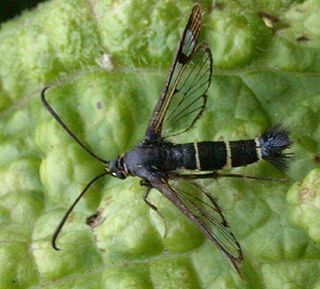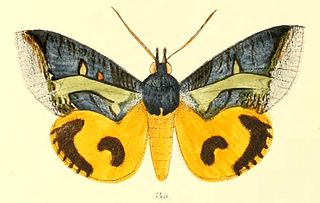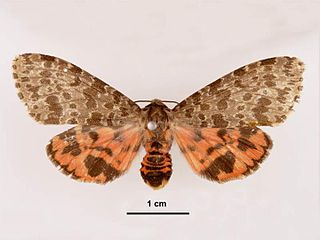
The Sesiidae or clearwing moths are a diurnal moth family in the order Lepidoptera known for their Batesian mimicry in both appearance and behaviour of various Hymenoptera.

Cephonodes hylas, the coffee bee hawkmoth, pellucid hawk moth or coffee clearwing, is a moth of the family Sphingidae. The species was first described by Carl Linnaeus in 1771. A widely distributed moth, it is found in the Near East, Middle East, Africa, India, Sri Lanka, Japan, Southeast Asia and Australia.

Machairophora is a genus of moths in the subfamily Arctiinae first described by George Hampson in 1893. Two species are included, which are found from Sri Lanka and Papua New Guinea only.

Corcobara is a monotypic moth genus of the family Erebidae first described by Frederic Moore in 1882. Its only species, Corcobara angulipennis, described by the same author in the same year, is found in India, Thailand, Cambodia, Myanmar, Malaysia, Indonesia, New Guinea, Sri Lanka and the Solomons.

Thyas coronata is a species of moth of the family Erebidae first described by Johan Christian Fabricius in 1775. It is found from the Indo-Australian tropics of southern China, Taiwan, Japan, Nepal, India, Sri Lanka to Micronesia and the Society Islands.

Eudocima phalonia, the common fruit-piercing moth, is a fruit piercing moth of the family Erebidae. The species was first described by Carl Linnaeus in his 1763 Centuria Insectorum. It is found in large parts of the tropics, mainly in Asia, Africa and Australia but introduced into other areas such as Hawaii, New Zealand and the Society Islands. It is one of major fruit pests in the world.

Eudocima homaena is a moth of the family Erebidae first described by Jacob Hübner in 1816. It is found in the Indian subregion, Sri Lanka, Myanmar, Taiwan, the Nicobars, Peninsular Malaysia, Borneo, the Philippines and on Christmas Island. It is a major pest on orange plants.

Asota ficus is a moth in the family Erebidae first described by Johan Christian Fabricius in 1775. It is found in Afghanistan, Bangladesh, China, Taiwan, India, Indonesia (Sumatra), Laos, Myanmar, Nepal, Pakistan, Sri Lanka, Thailand and northern Vietnam.

Semiothisa eleonora is a moth of the family Geometridae. It is found in south-west Asia, including India, Sri Lanka and Taiwan.

Tirathaba rufivena, the coconut spike moth, greater coconut spike moth or oil palm bunch moth, is a moth of the family Pyralidae. It is found from south-east Asia to the Pacific islands, including Malaysia, the Cook Islands, the Philippines and the tropical region of Queensland, Australia. They are considered as a minor pest.

Olepa ricini is a moth of the family Erebidae first described by Johan Christian Fabricius in 1775. It is found in Bangladesh, India, Nepal, and Sri Lanka. An older treatment placed the species in the genus Pericallia.
Machairophora fulvipuncta, not to be confused with the Machairophora moths, is a species of beetle in the family Mordellidae, the only species in the genus Machairophora.
Schrankia croceipicta is a species of moth of the family Erebidae. It was first described by George Hampson in 1893. It is found in Sri Lanka and the Seychelles.
Eilema punctifera is a moth of the subfamily Arctiinae first described by George Hampson in 1893. It is found in Sri Lanka.
Roxita adspersella is a moth in the family Crambidae. It was described by Pieter Cornelius Tobias Snellen in 1893. It is found in Sri Lanka.
Semioptila latifulva is a moth in the Himantopteridae family. It was described by George Hampson in 1920. It is found in Tanzania.

Semioptila flavidiscata is a moth in the Himantopteridae family. It was described by George Hampson in 1910. It is found in South Africa, Zambia and Zimbabwe.
Euproctis fulvipuncta is a moth of the family Erebidae first described by George Hampson in 1893. It is found in India and Sri Lanka.
Deuterarcha flavalis is a moth of the family Crambidae described by George Hampson in 1893.

Xenochroa chlorostigma is a moth of the family Nolidae first described by George Hampson in 1893. It is found in India, Sri Lanka, Himalaya, Sundaland, Philippines and Sulawesi.












